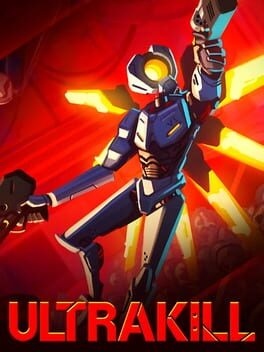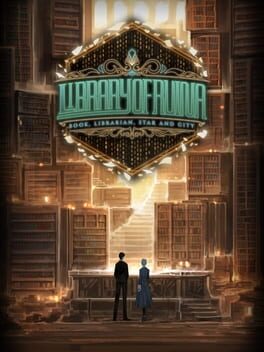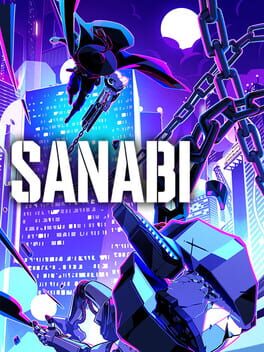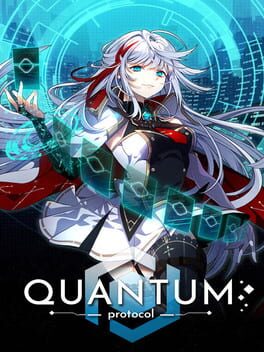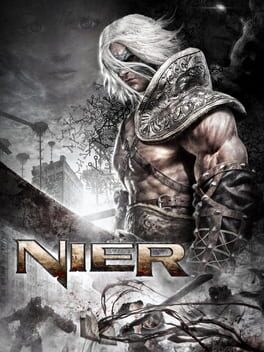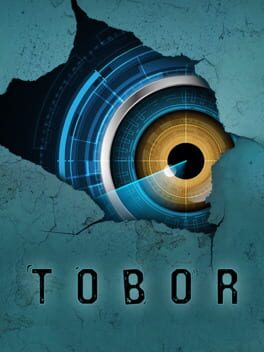Jonnymeboy
Bio
Just a guy trying to get some sleep.
Just a guy trying to get some sleep.
Badges

Liked
Gained 10+ total review likes

GOTY '23
Participated in the 2023 Game of the Year Event

GOTY '22
Participated in the 2022 Game of the Year Event

Best Friends
Become mutual friends with at least 3 others

3 Years of Service
Being part of the Backloggd community for 3 years

Popular
Gained 15+ followers

Noticed
Gained 3+ followers
Favorite Games
083
Total Games Played
000
Played in 2024
000
Games Backloggd
Recently Played See More
Recently Reviewed See More
This review is mostly spoiler free for those who don’t know what this game is and/or are interested in playing it
“The observer, when he seems to himself to be observing a stone, is really, if physics is to be believed, observing the effects of the stone upon himself. Thus science seems to be at war with itself: when it most means to be objective, it finds itself plunged into subjectivity against its will.” - Bertrand Russell
I first heard of Tobor through a singular word of mouth in a Discord server I’m in. It was one person recommending it to me through mutual interests in other games. When I went to look it up on Steam, my first thought after reading the synopsis and the descriptions on the page was, “I need to play this game.”
And then my excitement met my shock as I saw only around 70 people had reviewed it. I looked it up on How Long to Beat and it didn’t even have a page to its own. I looked it up on Backloggd and the page was completely blank. Barely any logs, no ratings at all, no reviews, not even a release date. The game had been out for 2-3 months at that point. After finishing my recent and first playthrough, I went to IGDB and personally put in a submission along with a friend for the proper release date and it was thankfully added a couple days after.
The first point of this preamble is that I want to really sell home that this game is UNKNOWN. It is not in the public eye. It does not exist as far as even more than 99% of people who play games are concerned. I looked into other indie games released in the same month of November 2023 and all of them have thousands of reviews and logs across Steam and Backloggd. They have HLTB pages as well. And I think all of this is for lack of a better phrase, a damn shame.
The second point of this preamble is that I became interested in Tobor and wanted to learn more above all else by experiencing what it has to offer, partly because it is so unknown. It is that observation and that interest, that desire to learn more, that is the driving force behind all of Tobor’s narrative and gameplay.
To put it simply, Tobor is a surveillance game where you control a spy robot named “Tobor” who is in charge of collecting information and learning more about a secret society and world dubbed “Undercroft” and its current 5 esoteric and eccentric inhabitants. You do so through controlling 16 live cameras on a monitor, scanning voice lines and objects in the environment, and then concluding the day by reporting to Ra Corporation (the company you work for) with your assembled pieces of information to figure out what’s happening.
Your first thought upon hearing this might be “How the hell am I supposed to keep track of 16 cameras?” and therein lies the first beauty of this game. The description on Steam and the game itself recognize this and ask you to focus on one of 5 individuals who will go about their day in specific cameras and task you with following their actions and thoughts to report back on at the end of the day.
Your second thought upon hearing that might be “This sounds really cool, but what about the other characters?” A playthrough lasts one week, technically 6 days of camera viewing and the final day, where you can chose the same or different character to focus on or keep track of. HOWEVER, this does not remove the other characters nor their lives from the feed. The character you chose to follow will walk around, do things, and interact with the 4 other characters which will let you learn more than just who that one person is. This is all happening LIVE as characters go about their day in this weird and twisted world that you constantly, through some unnerving feeling, gain the notion that you should not be viewing.
Realistically, you could follow the same character every single day based on personal interest and attachment. You could mix and match a couple. Or, if you’re the person I am and are interested in everything, can go through all 5 with a repeat on the last day. I gravitated towards starting with Stella, the entertainer of Undercroft, due to her upbeat, cheerful, and oddly tilted nature. And that was who I ended with on the 6th day after going through all the other 4. She caught my eye and I wanted to learn more about her. To hopefully empathize and understand her better. There were even multiple instances of me remembering what she said on a previous day and lamenting not following her or what she was doing, thinking to myself that I should have cared more about her story, her desires and wishes, because even though I followed her twice throughout the first week, it still feels like there's SO much to her character I didn't care enough to see on a first playthrough.
Because Ra Corporation has three rules: "DO NOT EMPATHIZE. DO NOT INTERFERE. DO NOT BETRAY.” And as a natural human being would, when one is told not to do something, their first train of thought is to ask why and most likely end up doing it anyway, especially when it involves a shady corporation that is trying their damndest to make you keep quota and nothing else. And it’s in this thug of war that Tobor finds its second beauty.
Tobor’s gameplay, as I’ve alluded to, is cycling through cameras to keep track of a character and to record voice lines that are deemed important by the game and scanning objects in the world. But what happens when you don’t know anything and everything is of interest? There were constant examples when I was watching my selected character and I caught a glimpse of something weird or sometimes even insane happening on another monitor that I forced myself to not care about because I felt compelled by the company to meet quota and not get a game over and be terminated. Working for this corporation was impacting my ability to care, to empathize.
There is a clock above the monitors. You begin your workday at about 10am and work until 9pm and the day ALWAYS ends at 9pm and the REPORT button starts flashing as the cameras are ongoing. Countless times I waited a bit after the button started flashing before pressing to squeeze every ounce of information I could see before fear of a game over or a termination got the better of me and the day ended by me turning in. I don’t even know what happens if you keep the button waiting at the end of the day but the mere thought of what could happen was, despite the embarrassment, enough to make me turn my eye away from the cameras.
Randomly, one of your assistants, will chime in throughout the day and say meaningless things like “Good job!” and “Ooooh, interesting stuff.” without a care in the world and it got to the point where something dramatic and important was happening and he chimed in to say “You’re doing great, buddy!” and I wanted to shout “Fuck off asshole.”
The gameplay also evolves to force you to make quick decisions or be unable to do your job, unable to see or care about what is happening on your screens, which is why I chose the quote at the beginning of this review for an express purpose: to illustrate the third beauty of this game.
Before I knew it, the game was influencing me. The people I was following, the world, the corporation and the choices were all things I was observing and influencing but were in fact also observing and influencing me. And the corporation’s and the game’s attempts to wrestle control away from me, to make me not care, to supersede my heart with scientific objectivity and certainty, made me want control back, made me care even more and made my heart glow with empathy in spite of attempts to crush it.
But at the end of the day, the game revels in learning more through viewing different perspectives on the same character or event. One character is not enough. One day is not enough. And one playthrough is not enough. The Steam achievement for completing your first playthrough is even called “Is there another Ending to this?” The devs wanted to make a game that you could play a bunch of times and still feel like you were getting something new or learning something you hadn’t known before. And while I haven’t started my subsequent playthroughs yet, they sure as hell succeeded in making me want to continue playing.
Obviously, there’s a lot more I could say but that delves into spoilers. And I think the beauty of observation is witnessing things you don’t know and/or that don’t make sense in the moment. But I will say this: if Tobor sounds like a game you would even remotely enjoy, please pick it up and play it. Observe it. Compel others to observe it. Allow the game to observe and influence you. Because in writing this review, I hope that above all else I have helped you observe this game and bring it to your eyes so that it will influence you just like it influenced me, so that it will not be forgotten and go unloved.
“The observer, when he seems to himself to be observing a stone, is really, if physics is to be believed, observing the effects of the stone upon himself. Thus science seems to be at war with itself: when it most means to be objective, it finds itself plunged into subjectivity against its will.” - Bertrand Russell
I first heard of Tobor through a singular word of mouth in a Discord server I’m in. It was one person recommending it to me through mutual interests in other games. When I went to look it up on Steam, my first thought after reading the synopsis and the descriptions on the page was, “I need to play this game.”
And then my excitement met my shock as I saw only around 70 people had reviewed it. I looked it up on How Long to Beat and it didn’t even have a page to its own. I looked it up on Backloggd and the page was completely blank. Barely any logs, no ratings at all, no reviews, not even a release date. The game had been out for 2-3 months at that point. After finishing my recent and first playthrough, I went to IGDB and personally put in a submission along with a friend for the proper release date and it was thankfully added a couple days after.
The first point of this preamble is that I want to really sell home that this game is UNKNOWN. It is not in the public eye. It does not exist as far as even more than 99% of people who play games are concerned. I looked into other indie games released in the same month of November 2023 and all of them have thousands of reviews and logs across Steam and Backloggd. They have HLTB pages as well. And I think all of this is for lack of a better phrase, a damn shame.
The second point of this preamble is that I became interested in Tobor and wanted to learn more above all else by experiencing what it has to offer, partly because it is so unknown. It is that observation and that interest, that desire to learn more, that is the driving force behind all of Tobor’s narrative and gameplay.
To put it simply, Tobor is a surveillance game where you control a spy robot named “Tobor” who is in charge of collecting information and learning more about a secret society and world dubbed “Undercroft” and its current 5 esoteric and eccentric inhabitants. You do so through controlling 16 live cameras on a monitor, scanning voice lines and objects in the environment, and then concluding the day by reporting to Ra Corporation (the company you work for) with your assembled pieces of information to figure out what’s happening.
Your first thought upon hearing this might be “How the hell am I supposed to keep track of 16 cameras?” and therein lies the first beauty of this game. The description on Steam and the game itself recognize this and ask you to focus on one of 5 individuals who will go about their day in specific cameras and task you with following their actions and thoughts to report back on at the end of the day.
Your second thought upon hearing that might be “This sounds really cool, but what about the other characters?” A playthrough lasts one week, technically 6 days of camera viewing and the final day, where you can chose the same or different character to focus on or keep track of. HOWEVER, this does not remove the other characters nor their lives from the feed. The character you chose to follow will walk around, do things, and interact with the 4 other characters which will let you learn more than just who that one person is. This is all happening LIVE as characters go about their day in this weird and twisted world that you constantly, through some unnerving feeling, gain the notion that you should not be viewing.
Realistically, you could follow the same character every single day based on personal interest and attachment. You could mix and match a couple. Or, if you’re the person I am and are interested in everything, can go through all 5 with a repeat on the last day. I gravitated towards starting with Stella, the entertainer of Undercroft, due to her upbeat, cheerful, and oddly tilted nature. And that was who I ended with on the 6th day after going through all the other 4. She caught my eye and I wanted to learn more about her. To hopefully empathize and understand her better. There were even multiple instances of me remembering what she said on a previous day and lamenting not following her or what she was doing, thinking to myself that I should have cared more about her story, her desires and wishes, because even though I followed her twice throughout the first week, it still feels like there's SO much to her character I didn't care enough to see on a first playthrough.
Because Ra Corporation has three rules: "DO NOT EMPATHIZE. DO NOT INTERFERE. DO NOT BETRAY.” And as a natural human being would, when one is told not to do something, their first train of thought is to ask why and most likely end up doing it anyway, especially when it involves a shady corporation that is trying their damndest to make you keep quota and nothing else. And it’s in this thug of war that Tobor finds its second beauty.
Tobor’s gameplay, as I’ve alluded to, is cycling through cameras to keep track of a character and to record voice lines that are deemed important by the game and scanning objects in the world. But what happens when you don’t know anything and everything is of interest? There were constant examples when I was watching my selected character and I caught a glimpse of something weird or sometimes even insane happening on another monitor that I forced myself to not care about because I felt compelled by the company to meet quota and not get a game over and be terminated. Working for this corporation was impacting my ability to care, to empathize.
There is a clock above the monitors. You begin your workday at about 10am and work until 9pm and the day ALWAYS ends at 9pm and the REPORT button starts flashing as the cameras are ongoing. Countless times I waited a bit after the button started flashing before pressing to squeeze every ounce of information I could see before fear of a game over or a termination got the better of me and the day ended by me turning in. I don’t even know what happens if you keep the button waiting at the end of the day but the mere thought of what could happen was, despite the embarrassment, enough to make me turn my eye away from the cameras.
Randomly, one of your assistants, will chime in throughout the day and say meaningless things like “Good job!” and “Ooooh, interesting stuff.” without a care in the world and it got to the point where something dramatic and important was happening and he chimed in to say “You’re doing great, buddy!” and I wanted to shout “Fuck off asshole.”
The gameplay also evolves to force you to make quick decisions or be unable to do your job, unable to see or care about what is happening on your screens, which is why I chose the quote at the beginning of this review for an express purpose: to illustrate the third beauty of this game.
Before I knew it, the game was influencing me. The people I was following, the world, the corporation and the choices were all things I was observing and influencing but were in fact also observing and influencing me. And the corporation’s and the game’s attempts to wrestle control away from me, to make me not care, to supersede my heart with scientific objectivity and certainty, made me want control back, made me care even more and made my heart glow with empathy in spite of attempts to crush it.
But at the end of the day, the game revels in learning more through viewing different perspectives on the same character or event. One character is not enough. One day is not enough. And one playthrough is not enough. The Steam achievement for completing your first playthrough is even called “Is there another Ending to this?” The devs wanted to make a game that you could play a bunch of times and still feel like you were getting something new or learning something you hadn’t known before. And while I haven’t started my subsequent playthroughs yet, they sure as hell succeeded in making me want to continue playing.
Obviously, there’s a lot more I could say but that delves into spoilers. And I think the beauty of observation is witnessing things you don’t know and/or that don’t make sense in the moment. But I will say this: if Tobor sounds like a game you would even remotely enjoy, please pick it up and play it. Observe it. Compel others to observe it. Allow the game to observe and influence you. Because in writing this review, I hope that above all else I have helped you observe this game and bring it to your eyes so that it will influence you just like it influenced me, so that it will not be forgotten and go unloved.
I finished Library of Ruina exactly 3 weeks ago but only now decided to write a review because, frankly, I was so overwhelmed with the finale and the entire experience that I couldn't formulate coherent thoughts on it. This is my attempt at doing so (without spoiling as much as I can):
Library of Ruina is many things: a card game, a deckbuilder, an RPG, a psuedo-visual novel, etc. But I think at its core, it's an experience about struggling, living in a merciless world where hopes, dreams, wishes and everything in between go to die. It touches upon subjects as profound and thought-provoking as free-will, vengeance and forgiveness of self and others with an incredible amount of depth, nuance and emotion, often times showing multiple perspectives on a single topic such that it never patronizes the player.
Both the gameplay and story contribute to this idea of living in such a cruel world, fighting against systems established beyond one's control, dictating virtually every aspect of life. The setting of the world, simply dubbed "The City," is a cruel and unjust place, yet people live in it, building lives and families. The gameplay can seem difficult and random, yet players have thrived within its systems, creating powerful builds and tricks to beat the game's most difficult challenges.
This mesh of both gameplay and story funnels down from this grandiose theme all the way to minor battles and story beats and is unlike anything I've ever seen. The level select for the main story is itself a flow chart of various groups and peoples, showing the sonder that exists within The City. The mechanics of every battle, down to individual passives that enemies have, especially the Abnormalities, accentuate the richness of the lives and stories behind the battles.
Every character in Ruina struggles with breaking free from these systems, these cycles of almost unsurmountable proportions. And the player gets to witness how they fail, live with and persevere through this world. It makes for what feels like a complete and fulfilling experience, even when realistically Project Moon has shown a fraction of the City and its potential as a fictional setting.
Library of Ruina is a truly special piece of media that I could go on ad nauseam. But I think I've covered all the major points I wanted to and I hope I've compelled you, at least a little bit, to play this game. Maybe I'll update this in the future with more in-depth and spoiler-y topics or maybe I'll write something else entirely. For now though, I'm happy with what I've put on paper.
Library of Ruina is many things: a card game, a deckbuilder, an RPG, a psuedo-visual novel, etc. But I think at its core, it's an experience about struggling, living in a merciless world where hopes, dreams, wishes and everything in between go to die. It touches upon subjects as profound and thought-provoking as free-will, vengeance and forgiveness of self and others with an incredible amount of depth, nuance and emotion, often times showing multiple perspectives on a single topic such that it never patronizes the player.
Both the gameplay and story contribute to this idea of living in such a cruel world, fighting against systems established beyond one's control, dictating virtually every aspect of life. The setting of the world, simply dubbed "The City," is a cruel and unjust place, yet people live in it, building lives and families. The gameplay can seem difficult and random, yet players have thrived within its systems, creating powerful builds and tricks to beat the game's most difficult challenges.
This mesh of both gameplay and story funnels down from this grandiose theme all the way to minor battles and story beats and is unlike anything I've ever seen. The level select for the main story is itself a flow chart of various groups and peoples, showing the sonder that exists within The City. The mechanics of every battle, down to individual passives that enemies have, especially the Abnormalities, accentuate the richness of the lives and stories behind the battles.
Every character in Ruina struggles with breaking free from these systems, these cycles of almost unsurmountable proportions. And the player gets to witness how they fail, live with and persevere through this world. It makes for what feels like a complete and fulfilling experience, even when realistically Project Moon has shown a fraction of the City and its potential as a fictional setting.
Library of Ruina is a truly special piece of media that I could go on ad nauseam. But I think I've covered all the major points I wanted to and I hope I've compelled you, at least a little bit, to play this game. Maybe I'll update this in the future with more in-depth and spoiler-y topics or maybe I'll write something else entirely. For now though, I'm happy with what I've put on paper.
The best way I can describe this game is like a combination of a classic TCG/CCG like Yu-Gi-Oh, Chess, a puzzle game, and a tower defense game and it nails every aspect of it with flying colors. There's so much thought put into the mechanics, so much strategy in the placement and usage of cards, let alone the deckbuilding aspect that is so common with these types of games. It's very challenging but very fair and rewarding. Every time I messed up, I felt like it was due to my own failures rather than the game's. In addition to all of that, there is a ton of variety in the decks and playstyles available and all of them are fun and have a high skill ceiling. There's truly something for everyone here.
The deckbuilding aspect itself is really unique since you can edit your deck mid combat, whereas other deckbuilders only allow you to edit your deck after each battle, leading to even more strategy and picking what cards you need for a given scenario and saving others for later.
The story and characters, while fun and charming in their own right, mostly take a backseat to the gameplay. It leaves a lot up to interpretation, which is perfectly fine for this type of game.
The pixel art on the cards is beautifully done and the sound/visual effects are immensely satisfying, making the game not only strategically appealing but aesthetically and musically appealing as well. The hacking theme permeates through the entire game and its ideas, everything from facing literal bugs and programs to playing your own programs such as repgraming your deck as a hacker and how archetype names are categorized with a dot before the name of the deck. This makes the experience very uniform and sensible.
I highly recommend this game to anyone looking for a unique strategy game, even more-so if you love deckbuilders like me and have played their fare share in the past and want something similar yet different.
The deckbuilding aspect itself is really unique since you can edit your deck mid combat, whereas other deckbuilders only allow you to edit your deck after each battle, leading to even more strategy and picking what cards you need for a given scenario and saving others for later.
The story and characters, while fun and charming in their own right, mostly take a backseat to the gameplay. It leaves a lot up to interpretation, which is perfectly fine for this type of game.
The pixel art on the cards is beautifully done and the sound/visual effects are immensely satisfying, making the game not only strategically appealing but aesthetically and musically appealing as well. The hacking theme permeates through the entire game and its ideas, everything from facing literal bugs and programs to playing your own programs such as repgraming your deck as a hacker and how archetype names are categorized with a dot before the name of the deck. This makes the experience very uniform and sensible.
I highly recommend this game to anyone looking for a unique strategy game, even more-so if you love deckbuilders like me and have played their fare share in the past and want something similar yet different.
